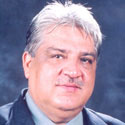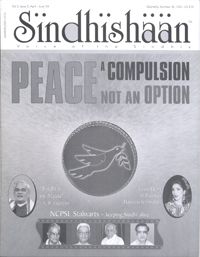NATIONAL COUNCIL FOR PROMOTION
OF SINDHI LANGUAGE (NCPSL)
by Ranjit Butani

Genesis
1947 – India gained independence. Unfortunately with Independence we witnessed the partition of our motherland and the uprooting of approximately 1.2 million Hindu Sindhis – driven out of their homes to find refuge and shelter in various corners of post-partition India.
After a long and arduous 20 year struggle for recognition, the Sindhi language was finally included in the VIIIth Schedule of the Indian Constitution on 10th April 1967.
But the damage was done. One by one the Sindhi medium educational institutions were downing shutters. Slowly but surely the language was losing ground. Slowly but surely lack of awareness of our roots, culture and heritage was creeping into our lives, and corrupting our very identity. Not only lack of awareness but the lack of any interest whatsoever in our historical roots was making inroads into our very being to the extent that the youth were on the verge of denying their very identity.
In 1968 it was passed in the parliament that the regional languages listed in the Schedule be promoted to the extent of providing an alternate to English as a medium of education at the University level. As a consequence, initiations to prepare text books in those regional languages for use at the college level were also taken. Financial assistance via the Ministry of Education was approved for the printing and publishing of deserving books in regional languages.
As Sindhi is not an exclusive regional language of any particular state (there being no state for Sindhis) it was concluded that the task of promotion of Sindhi language and literature be undertaken by the Department of Education, Government Of India (GOI) and consequently Sindhi educationists and litterateurs were invited for conferences in Delhi in 1970 and 1972, where it was concluded that just as in the case of Urdu, an autonomous council be established for Sindhi. However, this could not be immediately implemented and yet another meeting was called for where Sindhi scholars were invited and a “Sindhi Advisory Committee” formed, which held its first meeting in Delhi in 1976.
On the recommendation of this Committee, the Ministry of Human Resource Development, Department of Education, GOI, took the initiatives of establishing a Sindhi unit, under the offices of “Commission for Scientific and Technical Terminology” New Delhi and 3 years later this unit began to function under the “Central Hindi Directorate” (CHD).
Although the Sindhi unit undertook the implementation of several schemes towards the promotion and propagation of Sindhi language, the ‘Sindhi Advisory Committee’ relently persisted and pursued its demand for an autonomous institution with the Central Government.
These sustained efforts finally bore fruit and on 26th May 1994 ‘National Council for Promotion of Sindhi Language’ (NCPSL) came into existence. Taking into consideration the substantial Sindhi population residing in Gujarat and nearby regions, the headquarters of NCPSL were established in Vadodara. Pending the appointment of permanent directors to run the Council, Director of CHD – Dr. Gangasingh Vimal commenced activities from Delhi by appointing a special officer. The first meeting of the Council was held on 18th November 1994 in Gwalior which was chaired by Shri Madhavrao Scindia, Minister, Human Resources Development, GOI and it was resolved that the ongoing schemes for promotion and propagation of Sindhi language be continued as recommended by the Sindhi Advisory Committee.
On 28th July 1997 Dr. Kishore Vaswani, was transferred from CHD, Delhi to Vadodara on deputation as Director, NCPSL and from September 1997, NCPSL commenced functioning from Vadodara in full earnest.
NCPSL is the vital link among the voluntary Sindhi organisations, Ministry of Human Resource Development, Department of Education – GOI, Shastri Bhavan – New Delhi, State Governments, various Sindhi Academies and Educational Institutions.
Members of the Council
1. Chairman and Vice-Chairman–nominated by GOI
2. Minimum 2, Maximum 4 representatives of Voluntary Sindhi organisations in India. (preferably from different zones) – nominated by GOI.
3. Six Sindhi scholars — nominated by GOI.
4. Six prominent individuals interested in the promotion of Sindhi language — nominated by GOI.
5. Chairman – Council for Scientific and Technical Terminology, New Delhi.
6. GOI representatives from the HRD Ministry, Department of Education of whom one is from its internal finance division.
7. One representative each from 4 states/Union Territories with substantial Sindhi speaking population.
8. Director, Central Institute of Indian Languages, Mysore.
9. Director, Central Hindi Directorate, New Delhi.
10. Nominee of the Indian Council for Cultural Relations.
11. Director NCPSL.
Objectives
1. To promote, develop and propagate Sindhi language.
2. To develop appropriate technical terminology in Sindhi language for use in contemporary Sindhi publications and dispense technical and scientific information via appropriate publications.
3. To render advise to the GOI on matters of importance pertaining to development and progress of Sindhi language and having bearing on education.
4. To develop and implement schemes and promote activities in the interest of promotion of Sindhi language.
Approved Schemes
1. To print high standard books of Sindhi Literature.
2. Bulk purchase of Sindhi books, magazines, audio cassettes, CD’s etc. for free distribution to educational institutions and public libraries.
3. Awards for deserving writers of Sindhi books.
4. Workshops for young and talented Sindhi writers.
5. To organise seminars on various subjects of Sindhi Literature.
6. Financial assistance to litterateurs and organisations for promoting and publishing Sindhi literature and conducting seminars.
7. Development of Technical Terminology for use in publications, etc.
8. Innovative methods for teaching and promoting the language towards promotion of education in Sindhi.
Allied Activities
1. Co-ordination between the various voluntary Sindhi organisations.
2. Advising, guiding and apprising voluntary Sindhi organisations on Grants-in-Aids for promotion of Sindhi.
3. Constant interaction with voluntary Sindhi organisations, especially those receiving grants from Council/Ministry, for monitoring and reviewing progress on the implementation of approved programmes.
4. Creating linguistic harmony through voluntary Sindhi organisations.
5. Liaison with State Governments and Sindhi Academies.
Milestones
• In 1998-99, the Council was reorganised under the Chairmanship of Dr. Murli Manohar Joshi – Hon. Minister of HRD and Shri K.R. Malkani – Vice Chairman and new breath of life was infused by them. The first Executive Committee consisted of Dr. Murli Manohar Joshi, Shri K.R. Malkani, Shri Satish Rohra, Shri Parso Gidwani, Shri Suresh Keswani and some Government officials.
• On 26 September 2001, the Council and its Executive Committee was reorganised. Shri K.R. Malkani was appointed as Lt. Governor of Pondicherry and in his place Shri Jhamatmal Wadhwani was appointed as Vice-Chairman, who undertook the work of the Council with great enthusiasm and dynamism. Similarly, Dr. Jetho Lalwani was appointed on 2nd December 2002 as the Director of the Council in place of Dr. Kishore Vaswani.
• In 2000-01 Finance Committee, Grant-in-Aid Committee, Awards Committee, Programme Committee and Sindhi Language Learning Classes Committee were appointed.
• The highlight has been the “Sindhi Language Learning Course” which has been the blue eyed baby of current Vice-Chairman of NCPSL Shri Jhamatmal Wadhwani. Although conceived in 2000-2001 it has been Shri J.T. Wadhwani who has given dynamic impetus and momentum to its implementation, with a focused and demonic zeal.
Tours were undertaken by Shri J. T. Wadhwani to many places like Sangli, Nagpur, Ahmedabad, Vadodara, Gandhidham, Jamnagar, Bhuj, Adipur, Ajmer, Jodhpur, Jaipur, Beawer, Bhopal, Bairagarh, Raipur, Kanpur, Lucknow and Delhi to motivate and generate interest in Sindhi Teaching project. Primary Sindhi Reader-I for Sindhi language classes was compiled and produced. Sindhi Teachers Training Camps were organised in Mumbai, Beawer, Lucknow and Raipur and the 10th of April 2003 was celebrated as Sindhi Language Recognition Day.
And the results are there for all to see and applaud. 1383 students in 107 classes conducted at 17 centres successfully completed the “100 hour Sindhi Language Certificate Course” in the very first year of implementation. Exams were conducted on 26th and 27th December 2003 and the results on 26th January 2004 declared 95 pass percentage.
Encouraged by the response, NCPSL plans to introduce the Diploma Course from the current year.
Progress and Achievements
The year-wise expenditure on various schemes like Bulk purchase, Award of prizes, Financial assistance to voluntary organisations, publications and Sindhi Language Learning Courses Committee-:-
Year Exp. in Rs. 1* 2* 3* 4* 5* 6*
1995-96 612,634 — — 126 — 2 —
1996-97 1,464,860 — 2 — 1 3 —
1997-98 1,138,212 — — 200 — 2 —
1998-99 1,681,075 — 9 50 — 1 12
1999-00 2,657,599 — 9 85 1 2 6
2000-01 2,532,438 5 10 170 — — 3
2001-02 2,063,353 1 10 116 — — 3
2002-03 2,903,331 2 5 97 1 1 2
1.* Number of books, given financial support for publishing
2.* Number of cash awards to writers/artists.
3.* Number of books/magazines purchased under ‘Bulk purchase’ scheme.
4.* Number of workshops conducted.
5.* Number of seminars conducted.
6.* Number of seminars supported financially.
• 5 Award functions and approximately 45 prize awards of Rs. 15,000 – Rs. 20,000 to Sindhi writers under the Awards Scheme.
• 27 programmes financed under the Scheme of Financial Assistance to Voluntary organisations for selected promotional activities relating to Sindhi language.
• Approximate 844 books/magazines purchased under the “Bulk Purchase Scheme”.
• 8 writers provided with financial assistance for publication of Sindhi books.
• Sindhi Reader 1 Text book printed and distributed under “Sindhi Language Learning Course” scheme.


